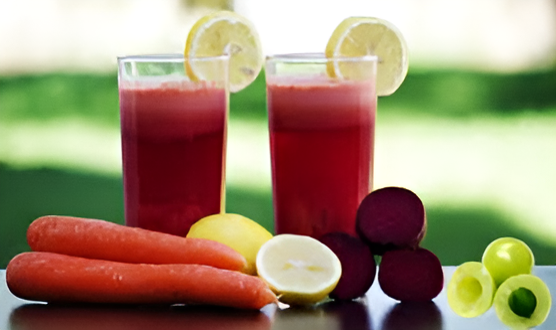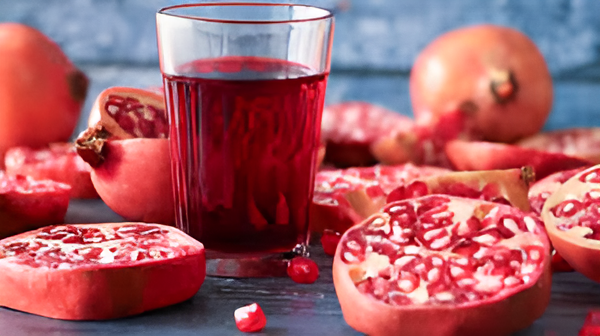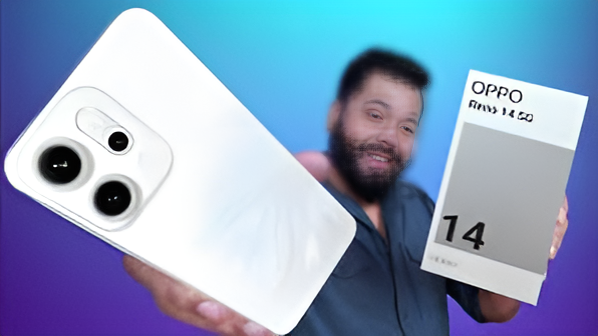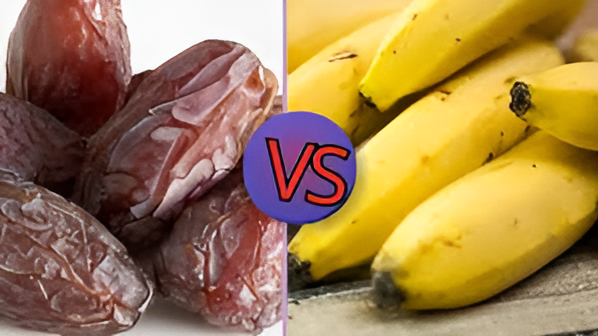
Fruits are consistently one of the best options for healthy snacking. Bananas and dates stand out as two of the most favored choices among them, thanks to their inherent sweetness, convenience for transport, and abundance of nutrients. Both fruits are packed with vital vitamins, minerals, and energy-enhancing carbohydrates—but which one is the superior, more nutritious snack?
This thorough comparison will examine the nutritional content, health advantages, and optimal applications of bananas and dates, aiding you in determining which one aligns more closely with your dietary requirements and lifestyle.
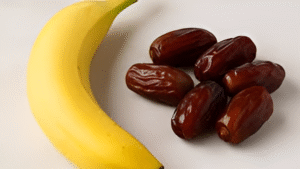
Nutritional Comparison: Banana vs Dates
We will begin with a comparative nutritional analysis (for every 100-gram portion):
| Nutrient | Banana | Dates (Deglet Noor) |
|---|---|---|
| Calories | 89 kcal | 277 kcal |
| Carbohydrates | 23 g | 75 g |
| Sugars | 12 g | 63 g |
| Fiber | 2.6 g | 6.7 g |
| Protein | 1.1 g | 1.8 g |
| Fat | 0.3 g | 0.2 g |
| Potassium | 358 mg | 656 mg |
| Magnesium | 27 mg | 54 mg |
| Iron | 0.3 mg | 0.9 mg |
| Vitamin B6 | 0.4 mg | 0.2 mg |
| Antioxidants | Moderate | High |
Key Takeaways:
- Dates contain more calories, sugar, fiber, and minerals.
- Bananas have fewer calories, are easier to digest, and have a higher water content.
Health Benefits of Bananas
1. Energy Boosting
Thanks to their natural sugars and simple carbohydrates, bananas provide a quick energy source. Athletes and fitness enthusiasts love them as pre- or post-workout fuel.
2. Heart Health
Bananas, which are high in potassium, can help reduce blood pressure and promote heart health by balancing sodium levels in the body.
3. Digestive Health
Bananas contain fiber, particularly pectin, which supports digestion and contributes to a healthy gut. Unripe bananas are also a source of resistant starch, which nourishes beneficial gut bacteria.
4. Mood and Brain Function
Bananas are rich in tryptophan (a serotonin precursor) and Vitamin B6, both of which aid in brain health and mood regulation.
5. Weight Management
Bananas are filling but low in calories, making them an excellent snack for those looking to lose or maintain weight.
Health Benefits of Dates
1. Natural Sweetener and Energy Booster
High in natural sugars such as glucose and fructose, dates provide a quick yet sustained energy release—ideal for extended workouts or fasting intervals.
2. High in Fiber
More than twice the amount of fiber found in bananas is present in dates. This facilitates healthy digestion and regular bowel movements, and may aid in lowering cholesterol.
3. Rich in Antioxidants
Dates contain flavonoids, carotenoids, and phenolic acid that combat inflammation and may reduce the risk of chronic diseases such as cancer and diabetes.
4. Bone and Blood Health
Due to their elevated amounts of calcium, magnesium, and iron, dates bolster bone strength and aid in anemia prevention.
5. Brain Health
Research indicates that dates could help mitigate inflammation and oxidative stress in the brain, possibly reducing the risk of Alzheimer’s disease.
Glycemic Index (GI): Impact on Blood Sugar
- Bananas: The GI varies from 42 to 62 (considered low to moderate) based on their ripeness.
- Dates: The GI of dates is approximately 42–55 (considered low), even though they have a high sugar content.
The glycemic index of both fruits is low to moderate, meaning they lead to a gradual increase in blood sugar levels. Nonetheless, it is advisable for people with diabetes to eat both of these in moderation.
When to Eat Bananas vs Dates
Eat Bananas When:
- A light snack or a quick breakfast is needed.
- You are either pre- or post-workout.
- You are controlling your weight or following a calorie-restricted diet.
- You require something that hydrates and is easy on the stomach.
Eat Dates When:
- It is necessary to have an energy source with high density (for instance, when fasting, hiking or exercising).
- You are in search of a natural substitute for sugar.
- Your fiber consumption needs to be raised.
- Your desire is for a gratifying treat that has more nutrients and is sweet.
How to Include Bananas and Dates in Your Diet
Bananas:
- Include in smoothies, oatmeal, or yogurt.
- In baking, use mashed banana as a replacement for sugar or eggs.
- Blend after freezing for a nutritious “nice cream.”
- Enjoy with peanut butter for a protein-packed snack.
Dates:
- Consume stuffed with nuts such as walnuts or almonds.
- Combine with oats and coconut to make energy balls.
- Chop and add to cereal, salads, or desserts.
- Utilize as a natural sweetener in smoothies or during baking.
Which Is Better: Banana or Date?
Your health goals will determine the answer:
| Goal | Best Choice |
|---|---|
| Low-calorie snack | Banana |
| High fiber | Dates |
| Quick energy | Dates |
| Digestive health | Both |
| Weight loss | Banana |
| Nutrient-dense snack | Dates |
| Hydration and light eating | Banana |
Possible Side Effects and Considerations
Bananas:
- Can lead to bloating in those who are sensitive.
- The glycemic load of bananas increases as they become overripe.
- Due to its potassium content, those suffering from kidney disease should avoid it in large amounts.
Dates:
- With a high sugar and calorie content; when consumed in excess, it’s not suitable for low-carb or weight-loss diets.
- Can adhere to teeth and, if dental hygiene is inadequate, may lead to cavities.
- Diabetics should eat it in moderation.
Conclusion
Both bananas and dates are packed with nutrients, providing numerous health advantages. Bananas are low in calories and ideal for anyone looking for a light, energizing snack. Conversely, due to their higher fiber, antioxidant, and essential mineral content, dates are perfect for anyone in need of a nutrient-dense, energy-rich snack.
You can incorporate both into your balanced diet based on your needs, rather than selecting one over the other. No matter if your goal is to energize, remain satiated, or indulge your sweet tooth in a healthy way, both fruits provide tasty and nutritious choices.
For more Information : Health tips , Entertainment, food Technology

